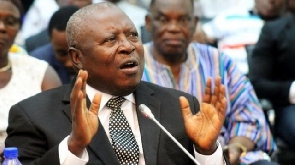Acting Chief Executive Officer of the Ghana Petroleum Commission, Egbert Faibille Jnr has disclosed that the number of Ghanaians working in oil and gas companies in Ghana has increased over the years as over 62 percent of persons currently working in the industry are Ghanaians.
This, he said follows a number of interventions his outfit has adopted to ensure Ghanaians benefit from job opportunities that are available in both local and international companies operating in the sector in the country.
Speaking at the launch of the Accelerated Oil and Gas Capacity (AOGC) Programme at the Regional Maritime University in Accra on November 7, 2017, Egbert Faibille Jnr said, “What is pleasing is that Ghanaians are increasingly occupying senior and management and core technical positions in the industry.”
This achievement, according to him can be traced to the Petroleum Commission’s establishment of a Localisation Unit to work closely with the Ghana Immigration Service to ensure “there is an alignment in the granting of work permits to expatriates and available Ghanaian expertise”.
He said the commission among other things, made sure that foreign companies working in the country employed qualified Ghanaians to occupy positions unless there was no Ghanaian expert available for the job.
“It is provided at Regulation 17(5) of LI 2204 thus: where Ghanaians are not employed because of lack of expertise, the contractor, subcontractor, licensee or other allied entity shall ensure to the satisfaction of the commission that every reasonable effort is made to provide training to Ghanaians in that field locally or elsewhere,” Mr. Faibille stressed.
He explained that “applications for work permits for expatriates with skills set that are available in-country are rejected and the applicant-company compelled to engage qualified Ghanaians to fill such vacancies,”
He commended the Ghana Immigration Service for supporting efforts of the Petroleum Commission which has lead achieving its objective.
Mr. Faibille also lauded government’s effort to build capacities of Ghanaians in order to prepare them for jobs in the Oil and Gas industry.
He believes that the introduction of the Accelerated Oil and Gas Capacity (AOGC) Programme will go far to trained more Ghanaians for the sector, curb unemployment and help manage Ghana’s oil resources properly.
Business News of Wednesday, 8 November 2017
Source: www.ghanaweb.com













